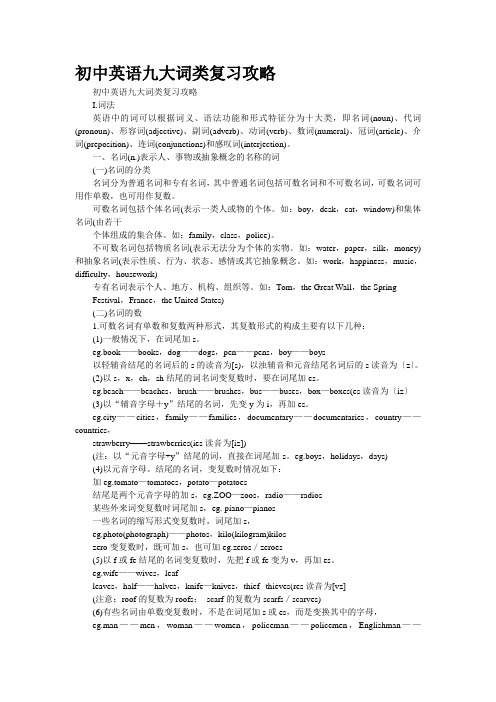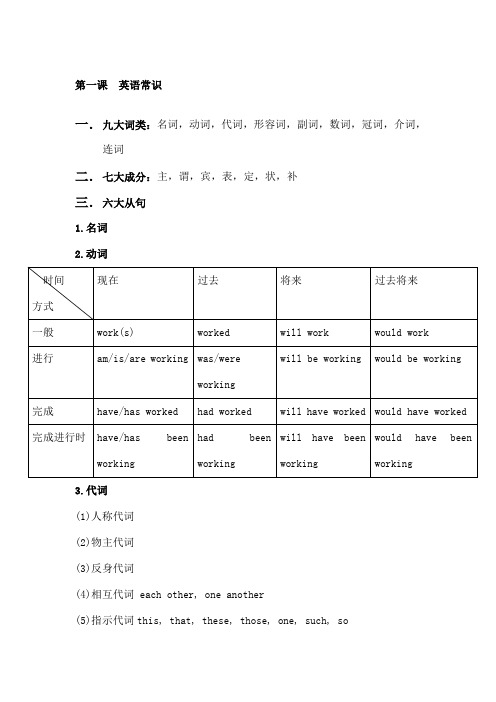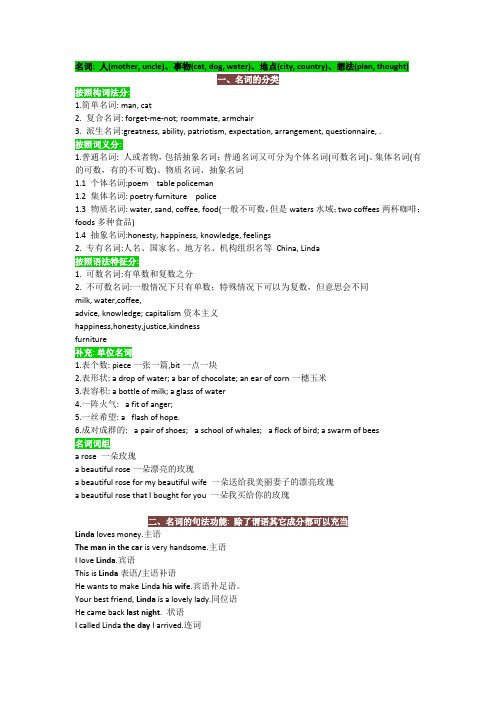英语九大词类
- 格式:docx
- 大小:12.09 KB
- 文档页数:1

初中英语九大词类复习攻略初中英语九大词类复习攻略I.词法英语中的词可以根据词义、语法功能和形式特征分为十大类,即名词(noun)、代词(pronoun)、形容词(adjective)、副词(adverb)、动词(verb)、数词(numeral)、冠词(article)、介词(preposition)、连词(conjunctions)和感叹词(interjection)。
一、名词(n.)表示人、事物或抽象概念的名称的词(一)名词的分类名词分为普通名词和专有名词,其中普通名词包括可数名词和不可数名词,可数名词可用作单数,也可用作复数。
可数名词包括个体名词(表示一类人或物的个体。
如:boy,desk,cat,window)和集体名词(由若干个体组成的集合体。
如:family,class,police)。
不可数名词包括物质名词(表示无法分为个体的实物。
如:water,paper,silk,money)和抽象名词(表示性质、行为、状态、感情或其它抽象概念。
如:work,happiness,music,difficulty,housework)专有名词表示个人、地方、机构、组织等。
如:Tom,the Great Wall,the SpringFestival,France,the United States)(二)名词的数1.可数名词有单数和复数两种形式,其复数形式的构成主要有以下几种:(1)一般情况下,在词尾加s。
eg.book——books,dog——dogs,pen——pens,boy——boys以轻辅音结尾的名词后的s的读音为[s),以浊辅音和元音结尾名词后的s读音为〔z〕。
(2)以s,x,ch,sh结尾的词名词变复数时,要在词尾加es。
eg.beach——beaches,brush——brushes,bus——buses,box—boxes(es读音为〔iz〕(3)以“辅音字母+y”结尾的名词,先变y为i,再加es。


英语十大词性及其详细讲解.词类又叫词性,英语单词根据其在句子中的功用,可以分成十个大类。
1.名词XXX学生2.代词XXX你3.形容词adjective adj. happy高兴的4.副词XXX迅速地5.动词verb v. cut砍、割6.数词XXX三7.冠词article art. a一个8.介词XXX在...9.连词conjunction conj. and和10.感叹词interjection interj. oh哦前六类叫实词,后四类叫虚词。
名词复数的规则变化名词的格在英语中有些名词可以加“‘s”来表示所有关系,带这种词尾的名词形式称为该名词的所有格,如:a XXX’s book。
名词所有格的规则如下:1)单数名词词尾加“'s”,复数名词词尾没有s,也要加“'s”,如the boy‘s bag男孩的书包,XXX。
2)若名词已有复数词尾-s,只加“'”,如:the workers’struggle工人的斗争。
大多数代词具有名词和形容词的功能。
英语中的代词,按其意义、特征及在句中的作用分为:人称代词、物主代词、指示代词、反身代词、相互代词、疑问代词、关系代词、连接代词和不定代词九种人称代词的用法:..I saw her with them,at least,I thought it was her.我看到她和他们在一起,至少我认为是她。
(her做宾语,them做介词宾语,her作主补)a. -- Who broke the vase?--谁打坏了花瓶?b. -- Me.--我。
并列人称代词的布列按次1)单数人称代词并列作主语时,其顺序为:第二人称you第三人称he/she;it第一人称I如:You, he and I should return on time.2)复数人称代词作主语时,其顺序为:第一人称we第二人称you第三人称they反身代词指示代词指示代词分单数(this/that)和复数(these/those)两种形式,既可作限定词又可做代词,疑问代词指人:who,whom,whose指物:what既可指人又可指物:which冠词是位于名词或名词词组之前或之后,在句子里首要是对名词起限制感化的词。

第一课英语常识一.九大词类:名词,动词,代词,形容词,副词,数词,冠词,介词,连词二.七大成分:主,谓,宾,表,定,状,补三.六大从句1.名词2.动词3.代词(1)人称代词(2)物主代词(3)反身代词(4)相互代词 each other, one another(5)指示代词this, that, these, those, one, such, so(6)不定代词:every, each, other, another, either, neither, no one, none, no, all, both, many, much, some, any, a few, few, a little, little, some-, any-,every-(-one,-body,- thing)(7)疑问代词:who, whom, whose, which, what(8)连接代词:who, whom, whose, which, what, whoever, whomever, whosever, whichever ,whatever(9)关系代词:who, whom, whose, which, that4.形容词5.副词(1) 时间副词:now, then那时, soon很快, ago, recently, lately, later, before, early, today, tomorrow, yesterday, tonight, suddenly, immediately, already, just, just now刚刚等。
如:(2) 地点副词:here, there, up, down, away, nearby, home, ahead, abroad, indoors, overseas, upstairs, downstairs等。
(3) 方式副词:表示行为方式的副词大多以-ly结尾,常见的有quietly, heavily, warmly, carefully, happily, politely, angrily等。

英语中十大词性 Ting Bao was revised on January 6, 20021十大词性:6大实词1、名词n.表示人、事、物名称的词2、代词pron.代指人、事、物名称的词也可以叫做:代指名词的词3、形容词adj.修饰名词的词4、副词:用来修饰动词、形容词、及其他副词的词Hecanrunfast.Verybeautifulspeak(very)well5、数词num.基数词:onetwothree序数词:thefirst,thesecond,thethird6、动词V.表示动作的词及物动词Vt.可以直接跟名词seeyou,eatmeat不及物动词Vi.不可以直接跟名词,需要介词链接lookatme4个虚词7、介词prep.表示关系的词oninatunder…后面必须跟名词或代词8、连词conj.起链接作用的词andbutsoor…9、叹词int.表示感叹的词Oh!Ah!10、冠词art.定冠词the不定冠词aan十大词性:6大实词1、名词n.表示人、事、物名称的词2、代词pron.代指人、事、物名称的词也可以叫做:代指名词的词3、形容词adj.修饰名词的词4、副词:用来修饰动词、形容词、及其他副词的词Hecanrunfast.Verybeautifulspeak(very)well5、数词num.基数词:onetwothree序数词:thefirst,thesecond,thethird6、动词V.表示动作的词及物动词Vt.可以直接跟名词seeyou,eatmeat不及物动词Vi.不可以直接跟名词,需要介词链接lookatme4个虚词7、介词prep.表示关系的词oninatunder…后面必须跟名词或代词8、连词conj.起链接作用的词andbutsoor…9、叹词int.表示感叹的词Oh!Ah!10、冠词art.定冠词the不定冠词aan。

名词: 人(mother, uncle)、事物(cat, dog, water)、地点(city, country)、想法(plan, thought)1.简单名词: man, cat2. 复合名词: forget-me-not; roommate, armchair3. 派生名词:greatness, ability, patriotism, expectation, arrangement, questionnaire, .1.普通名词: 人或者物,包括抽象名词;普通名词又可分为个体名词(可数名词)、集体名词(有的可数,有的不可数)、物质名词、抽象名词1.1 个体名词:poem table policeman1.2 集体名词: poetry furniture police1.3 物质名词: water, sand, coffee, food(一般不可数,但是waters水域;two coffees两杯咖啡;foods多种食品)1.4 抽象名词:honesty, happiness, knowledge, feelings2. 专有名词:人名、国家名、地方名、机构组织名等China, Linda1. 可数名词:有单数和复数之分2. 不可数名词:一般情况下只有单数;特殊情况下可以为复数,但意思会不同milk, water,coffee,advice, knowledge; capitalism资本主义happiness,honesty,justice,kindnessfurniture1.表个数: piece一张一篇,bit一点一块2.表形状: a drop of water; a bar of chocolate; an ear of corn一穗玉米3.表容积: a bottle of milk; a glass of water4.一阵火气: a fit of anger;5.一丝希望: a flash of hope.6.成对成群的: a pair of shoes; a school of whales; a flock of bird; a swarm of beesa rose 一朵玫瑰a beautiful rose一朵漂亮的玫瑰a beautiful rose for my beautiful wife 一朵送给我美丽妻子的漂亮玫瑰a beautiful rose that I bought for you 一朵我买给你的玫瑰Linda loves money.主语The man in the car is very handsome.主语I love Linda.宾语This is Linda表语/主语补语He wants to make Linda his wife.宾语补足语。
英语中常用词性
一、名词(Noun)
名词是指代人、事物、地点或概念的词,可以表示实物或
抽象事物。
二、动词(Verb)
动词是表示动作、变化或状态的词,对句子起到核心作用。
三、形容词(Adjective)
形容词用来描述名词或代词,表示人、事物或地方的特征
或性质。
四、副词(Adverb)
副词用来修饰动词、形容词或其他副词,表示程度、时间、地点等概念。
五、代词(Pronoun)
代词用来代替名词,避免重复使用特定的名词。
六、连词(Conjunction)
连词用来连接词语、短语或句子,使句子结构更加连贯。
七、介词(Preposition)
介词用来表示名词与其他词语之间的关系,通常与名词或
代词一起构成介词短语。
八、数词(Numeral)
数词用来表示数字,包括基数词和序数词两种类型。
九、感叹词(Interjection)
感叹词用来表示强烈的情感或感叹,通常独立成句。
以上是英语中常用的九种词性,它们在句子中扮演不同的
角色,共同构成了丰富多彩的英语语言。
在学习和运用英语时,了解每种词性的特点和用法对提高语言表达能力至关重要。
英语十大词类一览表英语是一种非常丰富多彩的语言,其词汇种类繁多。
在英语语法中,词类(parts of speech)是指根据其在句子中扮演的角色和语法功能来分类单词的方法。
在英语中,常见的词类有十种,它们分别是名词(nouns)、代词(pronouns)、形容词(adjectives)、副词(adverbs)、动词(verbs)、介词(prepositions)、连词(conjunctions)、冠词(articles)、感叹词(interjections)、和助动词(auxiliary verbs)。
下面将对这十大词类一一进行介绍。
名词名词是用来表示人、事物、地点、概念或抽象概念的词语。
它可以指示某一个人或事物的名称或类别,比如“apple”(苹果)、“book”(书)等。
代词代词是用来替代名词的词语,可以代替名词的全部或部分。
代词包括人称代词(如“I”、“you”、“he”)和指示代词(如“this”、“that”)等。
形容词形容词是用来描述名词或代词的特征或性质的词语,如“beautiful”(美丽的)、“tall”(高的)等。
副词副词用来修饰动词、形容词、其他副词或整个句子,用以表示时间、地点、方式、程度等概念。
比如“quickly”(快速地)、“very”(非常)等。
动词动词是表示动作、状态、感觉或想法的词语。
动词是句子的中心,可以告诉读者或听者发生了什么事情。
例如“run”(跑)、“eat”(吃)等。
介词介词用来表示名词或代词与其他单词之间的关系,包括位置、时间、方向等。
常见的介词有“in”(在…里面)、“on”(在…上面)、“at”(在…处)等。
连词连词用来连接词语、短语或句子,并且表达它们之间的关系。
比如并列连词“and”(和)、“but”(但是)、“or”(或者)等。
冠词冠词是用来限定名词的词语,分为定冠词(“the”)和不定冠词(“a”、“an”)。
定冠词“the”用于表示特指某一事物,而不定冠词“a”、“an”用于表示泛指某一事物。
九大词汇性之阳早格格创做1. noun(n.) 名词汇:to describe a person or thing英语中的名词汇根据是可可数又分为可数取不可数名词汇.(1)可数名词汇①可数名词汇准则变更:准则变更形成要领例词汇普遍情况加-s 如:pens、girls以“s, x, ch, sh”末端加-es 如:bus-buses、box-boxesWatch-watchesdish-dishes以辅音字母+y末端变y改i再加es 如:baby-babies、family-families以元音字母+y末端加-s 如:boy-boys、day-days以辅音字母+o末端加-es 如:potatoes、tomatoes以元音字母+o末端加-s 如:photos以f或者fe 末端的变f或者fe为v再加es 如:half-halves、wife-wives thief-thieves②可数名词汇不准则变更A、单复数共形:deer-deer fish-fish sheep-sheepB、词汇尾爆收变更:ox-oxen child-childrenC、里里单词汇爆收变更:foot-feet tooth-teeth goose-geese woman-women man-men mouse-mice policeman-policemenD、表示某国人时,中日稳定,英法变,其余国家加s:(1)Chinese-Chinese Japanese-Japanese(2)Frenchman- Frenchmen Englishman- Englishmen(3)German-Germans Russian-RussiansAmericans③特殊情况i. 另一些名词汇自己即是复数形式,不可用做单数.如:people,police,trousers,pants,clothes,scissorsii. 有些名词汇以s末端,然而不是复数形式,如:news,maths,physics,politicsiii. 有些名词汇既是可数名词汇又是不可数名词汇,如:room(空间)—a room(房间)work(处事)—works(著做)(2)不可数名词汇:(前里不克不迭用a,an等去建饰)①到暂时为止咱们所教的不可数名词汇有:A 液体类:water:juice,tea , soup ,milk,cola,coffeeB 肉类:meat,beef, pork, muttonC 粉终类:breadD 抽象名词汇类news,information,money,advice,friendship,work,homework,housework schoolwork ,help ,fun,health,priceE 食物类:food, broccoli, rice, porridge, junk food ,tofu②不可数名词汇计量的表黑: A个数单位词汇:piece (弛、片、块、条),如:a piece of newsB 容器单位词汇:bottle(瓶),bag(包),box(盒、箱)如:a bottle of milkC 类型单位词汇:kind( 种、类)D 度量衡单位词汇:kilo(千克、公斤)▲翻译底下的词汇组:1.二杯咖啡:2.四块里包:3. 七袋大米:4. 八只鹿:5.一滴火:6.三个男孩:(3)名词汇所有格(翻译为:……的):形成要领例句普遍正在有死命名词汇后加’s形成Linda’s desk若以s末端复数名词汇,则正在s后加’s,若不是以s末端复数名词汇,则加’s the boys’ friends the children’s day表示几部分共共的物品,只正在终尾一部分后加’sLucy and Lily’s mother表示几部分皆分别有的物品,则每部分皆加’sLucy’s and Lily’s book表示时间、距离的名词汇不妨加’s 或者’形成所有格形式Today’s newspaper Fifteen minutes’ walk表示某人的家、店铺、诊所时,常简略所有格后里的名词汇at my uncle’s=at my uncle’s home表示无死命实物的所有关系:普遍用..of..结构去表示无死命的名词汇所有格:a map of China 华夏天图 the name of the film 书籍的启里the cover of the book 影戏的名字▲Ⅰ用括号中所给词汇的适合形式挖空:1.The two girls are ( Japan )2. The ( baby ) are asleep3. Do you know the two ( man teacher ) ?▽当一个名词汇做定语证明另一个名词汇时,那个名词汇普遍用单数. eg.an apple tree,five apple trees,a girl friend,two girl friends,a twin sister然而是,当man战woman做定语建饰复数名词汇时,便要用其复数形式.eg.two men teachers,three women doctors4. The ( child ) are washing their ( foot ) .5.There are two ( people ) and lots of ( sheep ) in the fields .6. September 10 is ( teacher ) Day .7. I think physics ( be )more interesting than maths8. Don’t you think the ( radio ) are too noisy ?9. Whose ( knife )are these ?10. “ Whose house is this ?” “ It’s the ( Smith )” .2. verb(v.) 动词汇eg. do, make, go, take, bring 英语中动词汇根据其后是可不妨加宾语又分为:Vt. (及物动词汇)eg. speak, give, sing Vi. (不迭物动词汇)eg. run, work 英语中动词汇有5中形态:本形,第三人称单数形式,往日式,往日分词汇(用于完毕时或者主动语态中),当前分词汇do does did done doing work works worked worked workingI动词汇第三人称单数形式变更(三单变更)II. 动词汇往日式战往日分词汇变更(1) 准则变更(2) 不准则变更需要单独影象III 动词汇的当前分词汇形式变更⑴时态(找时间标记词汇):普遍当前时:⏹结构:am / is / are play / plays⏹推断:sometimes, often, usually, always, every,正在if / as soon as等复合句中,主将从现1. If you________ hard, you will pass the exam.A. studiesB. studyC. will studyD. is studying当前举止时:⏹结构:am / is /are playing⏹推断:Look, Listen, now, Where’s sb?⏹典型例题:--She______ in the bedroom.A. readsB. readC. is readingD. has read普遍往日时:⏹结构:was / were played⏹推断:yesterday, last…, …ago及语境.⏹典型例题:1. --You look tired. What did you do yesterday?--I ______ till night.普遍将去时:⏹结构:will play⏹推断:tomorrow, next…及语境,正在if /as soon as等主从复合句中,主将从现 .⏹典型例题:往日举止时:⏹结构: was /were playing⏹推断: at that time, at this time ,yesterday ,by+往日时间,by the end of+往日时间时常使用于戴有when/ while 的主从复合句中.⏹典型例题:1. Mom______ in the kitchen when I got home.A. cooksB. cookC. was cookingD. cookedA. didB. doC. will doD. was doing当前完毕时(动做从往日持绝到当前):⏹结构: has / have played⏹推断: just, already, yet, ever, never, so far(到暂时为止)次数(once,twice)since+时间面, for + 时间段, how long…⏹典型例题:A. worksB. workedC. is workingD. has worked+be(am/is/was/were/will be)+done如:① The hole should (dig) deep enough.② The students(tell) to clean the classroom.情态动词汇(can (could) ,may (might), must ,shall (should), will (would), dare (dared)敢, need等,其余,have to、had better也当做情态动词汇使用)后加动词汇本形▲(1)ATom _________ (come) from America. Now he (teach) English in a middle school inBeijing. In his free time, he would like ________ (go) in for a traditional sport so that he can (learn) more aboutChinese.BNow, people use satellites to do many things. So far, man (invent) four kinds of satellites. One of them (use) to study the weather.(2)AHenry, a 14-year-old boy, used (be )too fat to play sports. He went to the doctor and (tell) to have a balanced diet. So he tried _______ (not eat) too much meat orsugar because they might make him get heavier. Now he isn’t fat at all. He does sports every day and (become) a member of the school soccer team. Next week Henry will take part in theschool sports meet.BMy mother is very kind and easygoing, she helps me a lot. I (take) good care of in mydaily life by her. When I’m in trouble, she always encourages me to face my difficulties. With her help, I (become) a top student in my class already. I believe she (be) proud of me in the near future.3. adjective(adj.)形容词汇eg. good, beautiful, nice, happy, long 英语中形容词汇有二种形式:比较级战最下档eg. good- better- best nice- nicer- nicest1.比较级、最下档的形成①普遍正在词汇尾加er或者est great--greater——greatest②以e末端的只加r或者st nice——nicer----nicest③以辅音字母加y末端的,先变y为i,再加e 或者es heavy——heavier——heaviest easy——easier——easiest busy——busier——busiest funny——funnier——funniest early——earlier→earliest④以沉读关音节末端的词汇,先单写最终的一个辅音字母,再加er或者est big——bigger——biggest,thin——thinner——thinnest,fat—f atter→fattest,fit—fitter→fittest⑤音节战部分单音节词汇,前加more为比较级,加(the)most为最下档careful→more careful——most careful useful——more useful——most useful popular→more popular→most popular⑥不准则变更的词汇good/well→better→bestbad/ill/badly→worse→w orstmany/much→more→mostl ittle→less→leastold→older/elder→oldest(指年龄大小)/eldest(指少幼程序)far→farther/further→farthest(指距离)/furthest(指程度)2.形容词汇战副词汇比较级、最下档的用法(形容词汇最下档前里要加定冠词汇the)(1)形容词汇战副词汇比较级的用法①用于二者比较,表示“比…更…”(than前加比较级):eg.I am two years older than my little sister.②用于二者之间的共级比较,表示“…战…一般”(as+本级+as…):eg.Bill is as funny as his father.③表示甲正在某圆里不如乙:“A+系动词汇+not +as/so+形容i司本级+as十B”(as/so+本级+as)eg.These books aren’t as interesting as those.④表示某个范畴内的三者相比:“the+最下档+of短语(比较范畴)+复数名词汇”eg.Penny is thetallestof these girls. .Penny是那些女孩中最下的一个.⑤表示“越去越…”:“比较级+and+比较级”eg.In spring the days are getting longer and longer.正在秋天,黑日变得越去越少.⑥表示“越…越…”:“the+比较级…the+比较级”eg.The mort:you practice using English,the better you’ll learn it您英语练得越多,便会教得越佳.⑦正在比较级中,为了预防沉复,可用that或者those代替前里提到过的事务.The pants in this shop are a lot better than those(=the pants) in that shop.那家商店的裤子比那家商店的裤子品量佳得多.4. adverb(adv.)副词汇eg. fast, quickly, badly, well, happily及频次副词汇:much,(a)little,a bit,very,so,too 英语中副词汇也有二种形式:比较级战最下档 eg. fast-faster-fatest副词汇可建饰动词汇取形容词汇,分别搁正在动词汇之后,形容词汇前.Eg:She speaks English well.He has a very nice watch.▲(1)About 20 minutes later, Lizzie managed to(success) pull herself(2) The river was so polluted that it ______(actual) caught fire and burned.(3)If so, you can (simple) do some online shopping.(4)They were (extreme) close!5. pronoun(pron.)代词汇eg. this, that, it, she, he, I, you, they 英语中代词汇有:人称代词汇,指示代词汇①人称代词汇又有主格战宾格,形容词汇性物主代词汇战名词汇性物主代词汇I是主格做主语,普遍位于句尾.my 是形容词汇性物主代词汇,用于名词汇前做定语:尔的,如:my bookme的宾格形式,位于动词汇后做宾语,如:Do you understand me?您懂尔吗?mine 是名词汇性物主代词汇,相称于my+名词汇的意思如:It is mine=it is my book. Mine is missing=my pen is missing.主格I you he she It we you they宾格me you him her it us you them my your his her its our Your their形容词汇性物主代词汇mine Yours his hers its ours yours Theirs 名词汇性物主代词汇戴有反身代词汇的时常使用短语.teach oneself自教help oneself to随便吃些…吧learn...by oneself自教…enjoy oneself过得舒畅②大概代词汇(1)each"每个/各个”(强调个体)(2)every"每个/各个”(强调部分)(3)both表示二者“皆”(强调部分)(4)all“部分/大家/十足”用于三者以上(5)either“二者之一”,用于二者(强调个体)(either of)(6)neither“二个皆不”,用于可定二者.(neither of)(7)none“不一部分/物”用于可定三者或者三者以上的可数名词汇(none of+可数名词汇)(8)one用去代替前里刚刚提到的一个物品或者一部分,免得沉复;复数ones用去代替前里提到的一些物或者一些人(9)few(+复数名词汇),little(+不可数名词汇)表示“出多/很少”(表可定).afew(+复数名词汇),alittle(+不可数名词汇)表示“有一些/有几个”(表肯定).(10)1.○ ● one……the other表示二部分或者二件物品中的“一个…另一个”2.○ ○○●○ one ………another表示大概数目中的“一个”取“另—个”.3.○ ●●● one ……the others强调正在一定范畴中的“一个”取“其余的”.4.○○○●●●● some…… the others表“一部分”取“其余的局部”.③疑问代词汇(1) who/whom谁(指人).(2) whose谁的(做定语)(3) which哪一个,哪一些(指人或者物)(4) what什么(指物)6. preposition(prep.)介词汇eg. in, on, by, at, under, behind, from, to, for, with, 介词汇为英语中的小词汇,然而它们的效率可大着呢!7. numeral(num.)数词汇eg. one, two, three, first, sencond, third 数词汇分为基数词汇战序数词汇二类注意下列变更:(1)不准则变更on e→first,two→second,three→third,five→fifth,eight→eighth,nine→ninth,twelve--~twelfih(2)以y末端的十位整数,变y为ie再加thtwenty→twentieth,forty→fortieth,ninety→ninetieth8. conjunction(conj.)连词汇eg. and, but, because, so, after, before,then, 连词汇连交二个句子,并能表示二个句子之间的关系I从属连词汇(用去带领从句)①带领时间状语从句:after,before,when,while,as,until,till,since,as soon as②带领本果状语从句:because,as,since③带领手段状语从句:so that,in order that 为了④带领截止状语从句:so that,so…that,such...that 以至于…9. article(art.)冠词汇英语中冠词汇共3个,分为二类:大概冠词汇a an、定冠词汇the (采用时可采用代进翻译)如:23.Look at _______ horse over there.A.a B.an C.the D./25.There is _______ old woman in the car.A./ B.the C.a D.an△大概冠词汇:a an“一个”①文章第一次提到的人或者实物②表示“每—(个)”,相称于every.(twice a week.=twice every week) △定冠词汇:the“那个”①文章第二次提到的人或者实物②用正在形容最下档战部分比较级前.the taller③用正在序数词汇前.the second day of a week④用正在天下上独一无二的实物前(如太阳、月明、天下、天球、天空、宇宙等).the earth⑤正在某些形容词汇前,表示—类人或者物.therich(富人),the poor(贫人),the deaf(聋人),the blind(盲人),the dead(死者),the wounded(伤员)⑥用正在乐器前.Play the piano△不必冠词汇的情况:①正在球类疏通战棋类游戏前时不必冠词汇..play basketball/soccer/chess②正在三餐前不必冠词汇.have breakfast/lunch/supper/dinner③正在人名、天名、节假日、星期、月份前不必.Tina,China,New Year’s Day,Tuesday,January④正在教科战节目称呼前不必冠词汇.My favorite is English.⑤正在某些牢固拆配中不必冠词汇.eg.at noon, at work,at home,by bus, by air,on foot,from morning till night,at night,go to school,go to bed,at last ▲1.We can't see _______ sun at _______ night.A.the;the B.the;/ C.a;/ D./;/2. _______ woman over there is _______ popular teacher in our school.A.A;an B.The;a C.The;the D.A;the3.They made him _______ king.A.a B.the C.an D./4.Does Tom often play _______ football after _______ school?A./;/ B./;the C.the;/ D.a;/5.They passed our school _______ day before yesterday.A.an B.one C.a D.the6.This is _______ apple.It's _______ big apple.A.an;a B.a;the C.a;an D.an;the7.I've been a student there for nearly two and _______ half years. A.a B.an C.the D./8.The museum is quite far.It will take you half _______ hour to get there by _______ bus.A.an;/ B.an;a C.a;/ D./;/。
英语九大词类
英语九大词类包括:
1.名词(Nouns):表示人、事、物等实体或概念的词。
2.动词(Verbs):表示动作、状态或行为的词。
3.形容词(Adjectives):修饰名词或代词,描述其性质、特征或状态的词。
4.副词(Adverbs):修饰动词、形容词或其它副词,描述动作、状态或方式等的词。
5.介词(Prepositions):连接名词或代词与动词、形容词等,表示位置、方向、时间等关系的词。
6.连词(Conjunctions):连接两个或多个句子成分,表示逻辑关系(如因果、转折等)的词。
7.冠词(Articles):放在名词前面,限定名词的范围或数量的词。
8.数词(Numerals):表示数量、顺序或度量单位的词。
9.代词(Pronouns):代替名词或代词,表示人称、接受者以外的语法主体的词。
以上就是英语中的九大词类。